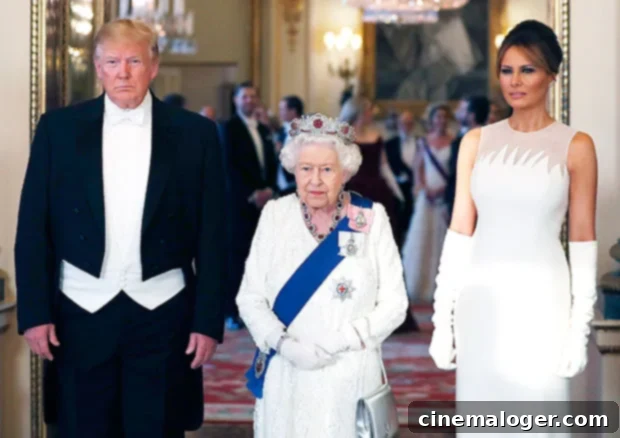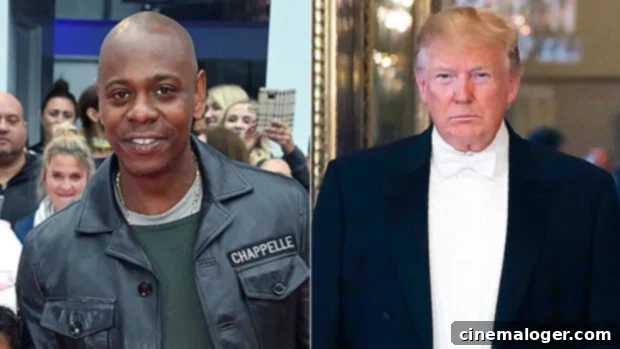Dave Chappelle Reveals Celebrities Left “Crazy Notes” for Trump Administration During Obama’s White House Transition
Comedian Dave Chappelle provided a fascinating and somewhat scandalous anecdote concerning the presidential transition from Barack Obama to Donald Trump. Chappelle, known for his incisive social commentary and comedic observations, recounted witnessing celebrities leaving “crazy notes” intended for the incoming Trump administration in the drawers and cabinets of the White House during one of Obama’s final farewell parties.
The revelation came during a candid interview with supermodel Naomi Campbell on her YouTube series, No Filter with Naomi. Chappelle’s account offers a unique, celebrity-level perspective on the intense emotions and political polarization that characterized the transfer of power in early 2017, suggesting that some high-profile individuals took matters into their own hands to express their disapproval of the incoming administration.
Recalling the atmosphere of the event, Dave Chappelle explained, “It was one of the last big parties the Obamas threw, and I’m not gonna say these celebrities’ names… There was a thing.” He continued to describe the scene, setting the stage for his startling observation. “Remember when the Trump administration moved in, they said, ‘The Obama staff left dirty notes for us in all the drawers and all the cabinets.’ Now, I saw this happening.” This statement directly links his personal experience to the broader public controversy that erupted later regarding the alleged “sabotage” of the White House offices.

Chappelle, however, was careful to distinguish between the accusations leveled against Obama’s staff and what he personally witnessed. “I’m not gonna say who did it,” he reiterated, emphasizing his commitment to discretion while still validating the existence of such notes. “But it was celebrities writing all this crazy s**t and putting it all over there and I saw them do it, so when I saw that news I laughed real hard.” His laughter, he implied, stemmed from the realization that the public narrative had somewhat misattributed the source of these notes, or at least failed to capture the full picture of who was involved.
Dave Chappelle’s claim provides a new dimension to a controversy that initially flared up in November 2019. At that time, then-White House press secretary Stephanie Grisham made her own allegations, asserting that former Obama aides had deliberately left behind disparaging notes for the incoming Trump administration. Grisham claimed these notes contained messages such as, “you will fail” and “you aren’t going to make it.” Her statements were widely reported, including by CNN reporter Abby D. Phillip, who tweeted about Grisham’s remarks made during a radio interview.
WH Press Sec Stephanie Grisham claims Obama aides left ‘you will fail” notes in offices for Trump aides: “We came into the WH, I’ll tell you something. Every office was filled with Obama books and we had notes left behind that said ‘you will fail,’ ‘you aren’t going to make it,’”
— Abby D. Phillip (@abbydphillip) November 19, 2019
The tweet by Abby D. Phillip succinctly captured Grisham’s accusations: “WH Press Sec Stephanie Grisham claims Obama aides left ‘you will fail’ notes in offices for Trump aides: ‘We came into the WH, I’ll tell you something. Every office was filled with Obama books and we had notes left behind that said ‘you will fail,’ ‘you aren’t going to make it.’'” These claims immediately ignited a media firestorm and drew strong reactions from both sides of the political spectrum. The notion of a departing administration actively trying to undermine its successor, even through petty notes, struck many as a violation of traditional norms surrounding the peaceful transfer of power.
However, Grisham’s claims were swiftly and vehemently denied by former Obama administration officials. Susan Rice, who served as Obama’s National Security Advisor, took to Twitter to refute the allegations, calling them “another bald faced lie.” Similarly, Jon Wolfsthal, a former senior director of the National Security Council, dismissed Grisham’s statement as an “outrageous lie,” adding, “I know. I handed over the nuclear office at the (National Security Council). Shameless and disgusting.” These strong denials from high-ranking officials underscore the seriousness with which such accusations were viewed and the immediate effort to discredit them.
Understanding the Context of the Transition and the Allegations
The presidential transition from Barack Obama to Donald Trump was, by many accounts, one of the most contentious and unusual in modern American history. Marked by deep political divisions, a highly charged media landscape, and unprecedented levels of public scrutiny, every detail of the handover was magnified. The White House, as the symbolic heart of American democracy, is traditionally prepared for its new occupants with meticulous care, often involving the departing staff leaving welcoming notes and practical advice for their successors. Grisham’s claims, therefore, suggested a stark departure from these established customs, painting a picture of deliberate animosity.
Dave Chappelle’s intervention adds a fascinating layer to this narrative. While Grisham’s allegations focused squarely on “Obama aides,” Chappelle’s account points to “celebrities” as the culprits behind at least some of the “crazy s**t” found. This distinction is crucial. It suggests that while the official staff might not have engaged in such acts as widely claimed by Grisham, other individuals present at a high-profile social event felt compelled to express their sentiments in a tangible, albeit surreptitious, manner. This highlights the intense emotional investment that many public figures had in the political outcome, extending beyond formal political roles.
The discrepancy between “Obama staff” and “celebrities” also makes it challenging to reconcile the two accounts entirely, yet Chappelle’s statement does provide some corroboration for the *existence* of negative notes, even if the authorship differs from Grisham’s initial accusation. It suggests that the atmosphere was indeed charged enough for such acts to occur, regardless of who specifically penned the messages. The nature of these “crazy notes” as described by Chappelle also aligns with the spirit of Grisham’s claimed “you will fail” messages, indicating a shared sentiment of opposition and ill-will towards the incoming administration.
The Significance of Celebrity Involvement
The involvement of celebrities in political discourse and activism is nothing new, but Chappelle’s story illuminates a more clandestine and potentially boundary-pushing form of protest. White House parties during an outgoing administration are typically moments of reflection, celebration, and closure. However, in this particular instance, amidst the impending change of leadership, some attendees apparently chose to make a more pointed statement. This speaks to the profound political polarization of the era, where even social gatherings in the nation’s most prestigious home could become venues for expressing dissent.
For many celebrities, the 2016 election results and the subsequent transition represented a significant cultural and political shift they opposed. Leaving notes, even if ultimately symbolic and perhaps unnoticed for a time, could have been perceived as a small act of defiance, a personal pushback against what they viewed as an unwelcome change. Chappelle’s casual observation of these acts underscores how widespread and perhaps openly discussed such intentions might have been among certain social circles attending the party.
Conclusion: An Unresolved Chapter in a Contentious Transition
The controversy surrounding “dirty notes” left for the Trump administration remains a contentious footnote in the history of presidential transitions. While Stephanie Grisham’s specific claims regarding Obama aides were strongly denied by those officials, Dave Chappelle’s firsthand account adds a compelling and credible witness to the narrative that *some* negative messages were indeed left behind. His testimony shifts the focus from official staff to celebrity attendees, suggesting a broader, perhaps more informal, expression of discontent.
Ultimately, this episode serves as a powerful illustration of the unprecedented political tensions that defined the 2016-2017 transition. It highlights how deeply felt political divisions permeated various levels of society, from official government structures to high-profile social gatherings, leading to actions that departed from traditional norms of civility and smooth handover. Chappelle’s revelation ensures that the story of the “crazy notes” remains a captivating, if still partially unresolved, aspect of that turbulent period in American politics.
